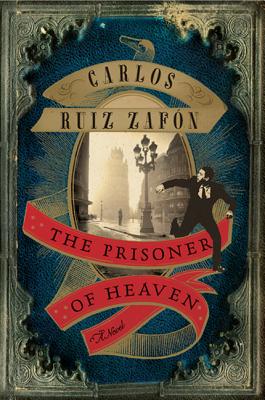The Prisoner of Heaven
by Carlos Ruiz Zafón
And here’s the awesome thing… Within mere pages I was immersed in Ruiz Zafón’s Barcelona. I love authors whose use of language is as idiosyncratic as a fingerprint, and Ruiz Zafón is one. I’d recognize his style immediately, whether his name was on the cover or not. He has stated in the past that the four books that make up this tetralogy can be read in any order, and that was true enough for the first two books, but not, perhaps, for this one. Here’s why:
Bookseller and bibliophile Daniel Sempere was at the heart of The Shadow of the Wind. And while there was plenty of intriguing overlap, The Angel’s Game told the story of writer David Martín in an earlier timeline. The Prisoner of Heaven is the perfect bridge between these two books. It’s told in two different times, and it picks up on the stories of both Daniel and David after the ends of their prior novels. And while there are many, many connections between these two men, the one at the heart of this novel is Daniel’s best friend and bookstore employee, Fermín Romero de Torres.
In the present day of the novel (1958), a visit to Sempere & Sons by a disquieting stranger who leaves a gift for Fermín is the catalyst for the older man to at last come clean about his past. Flashing back to 1939, Fermín tells Daniel about his imprisonment during the war. That was where Fermín met David Martín, and the man had a significant impact on his life. There’s more to the tale, of course, but that’s all I’m telling you.
If this novel has a flaw, it’s that it’s a super-quick read. And it’s just so completely enjoyable that it will leave you aching for book four. As for this book, aside from its shortness, it is notably less complex than the prior offerings. Less complex on its own, that is. The way it fits into the puzzle of the larger story is pretty freakin’ fantastic.
As a writer, Ruiz Zafón’s strengths and weaknesses are fairly consistent. As noted above, at the heart of this novel are characters we already know. They feel well-fleshed to the point that I should be able to recognize them on the street. Time spent at Sempere & Sons feels like visiting old friends. Ruiz Zafón’s prose continues to be somewhat florid, but you know, I like it. Not every author is going to write: “Outside, a cold Monday awaited him, sprinkled with snowflakes that drifted in the air and settled on passers-by like glass spiders hanging from invisible threads.” If you’re reading this review, you’ve already formed an opinion on the man’s prose. Love him or hate him, expect more of the same.
And if you haven’t already formed that opinion, my advice is to read the first two books in either order and then return to this one. As for me, I’m waiting with mixed emotions for the conclusion to this fantastic quartet of novels. I want it! I want it! But I don’t want it to be over.

Again, I must agree on your judgment of a book. I also loved it that within minutes, I felt I was back in Zafón's Barcelona as if I'd never left. His writing is so beautiful and special, and recognisable - it was a pleasure to start reading (and keep reading) this book.
ReplyDeleteI also thought the story had some weaker points, but in all, it was a good read.
I have to contradict you on one thing: I didn't read The Angel's Game and didn't feel I was missing anything. I now do want to read it pronto as it deals with the writer David Martín who is also mentioned in this new book, but I didn't feel I missed out by not having read it yet. I did read the first book twice. :-)